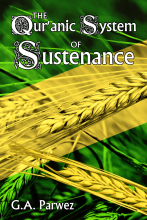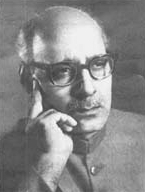Excerpted from The Qur’anic System of Sustenance by G.A. Parwez
(trans. Saleena Karim & Fazal Karim)
FOREWORD (editor)
 Ghulam Ahmad Parwez was without doubt one of the greatest minds of the last century. In his time he was misunderstood and deemed a heretic in his own country, and his essentially rationalist approach was viewed with much suspicion in the Muslim world. Since his death in 1985 however, his popularity has steadily grown both in Pakistan and across the world. The full impact of his work has yet to be properly assessed and appreciated.
Ghulam Ahmad Parwez was without doubt one of the greatest minds of the last century. In his time he was misunderstood and deemed a heretic in his own country, and his essentially rationalist approach was viewed with much suspicion in the Muslim world. Since his death in 1985 however, his popularity has steadily grown both in Pakistan and across the world. The full impact of his work has yet to be properly assessed and appreciated.
My father (Fazal Karim) and I feel honoured to have had the opportunity to translate Parwez’s seminal work, Nizam-e-Rabbubiyat, into English. The Urdu title literally translates to System of (Universal) Sustenance, but over the years among those discussing his work in English it has wrongly been referred to as the ‘Qur’anic Economic System’, which is not only a misnomer, but also exposes a gross misinterpretation of Parwez’s thought. Although this book discusses communism and capitalism in light of Qur’anic principles, and, notwithstanding the fact that Parwez describes this book as a ‘monograph on the subject of economics’ [1], it is fair to say that it does not, as such, present a purely economic system with the mere aim of meeting material needs. Whereas the very word ‘economy’ implies an acceptance of the scarcity principle, the Divine principles of sustenance cannot be characterised together as ‘economy’, being based on the Qur’an’s self-attested principle of ‘abundance’. Nor should the Urdu word nizam (system) in the title be taken to mean a closed system. On the subject of the word deen (usually translated as ‘religion’), Parwez has stated elsewhere that whilst ‘way of life’ (or ‘system’) is the closest meaning of the Arabic, even this is insufficient. Deen certainly is a systemic word, but it does not literally translate to ‘system’. Since (to paraphrase Parwez) Islam as a deen equates to the Divine process of sustenance (Rabbubiya) at work throughout the universe, [2] his chosen Urdu word nizam likewise does not point to a fixed system, but to a set of principles taken together as a whole.
Moreover, this book is really an attempt to delineate the Qur’anic method of meeting human needs in their entirety – both material and ‘spiritual’. Parwez himself remarks in Chapter 4: ‘Meeting our physical needs is a means to an end, and not an end in itself’. Again in Chapter 8, he writes: ‘The higher purpose of the Divine system of sustenance is not just to meet the physical needs of people. Indeed, meeting physical needs is only a rudimentary and superficial aim. From the Qur’anic perspective this is only a step in the direction of life’s true purpose, which is to develop and perfect the self, and this can be achieved only by enacting the principle of universal sustenance’.
In short, Parwez has tried to show that the Divine system of sustenance not only serves to rewrite the generally accepted rules of economy, but also those of human society, and by extension, of reality. While there are those who would view Parwez’s views as utopian and unrealistic, he was inspired by the Qur’anic line that it is all ‘easy for God’ (as mentioned in Chapter 8 of this book) – suggesting that what may seem difficult in view of humanity’s present mindset would in fact be very easy for a nation that understands the Divine Message.
The translation
This is a translation of the 1978 edition with minor editorial revisions and additions made by the translators solely for the purpose of clarifying the content of the main text. We have also added footnotes (all marked Translators’ note), again to either expand upon or clarify statements made in the original Urdu text.
The chief difference between the original 1955 and 1978 editions was the addition of some appendices by Parwez, namely: Islami Socialism (Islamic Socialism), 2) Jahaan Marx Na-Kaam Reh Geya (Where Marx Failed), Mao Tse Tung aur Qur’an (Mao Tse Tung and the Qur’an: A Comparison) and Riba ke Behs (The Debate Over Interest). As these titles suggest, Parwez wrote these appendices mainly to address communism, which was still operational in both Russia and China at the time. Since then communism has essentially failed worldwide (even China, while technically remaining a communist state, is behaving increasingly like a modern capitalist state in practice), and so the content of these appendices is no longer relevant to the present economic climate. For this reason we have not reproduced them. However we have translated two important sections on zakaat and riba from the third of Parwez’s appendices, Riba ke Behs, and included it as a short additional chapter, inserted before the Afterword.
When it comes to quotes from the Qur’an, we have taken the liberty of inserting well-known English translations (slightly edited to modernise the English) wherever Parwez has referred to particular verses and reproduced the Arabic. Parwez’s approach (as he explains in his Preface to the 1978 edition, also reproduced in this book) was to translate meaning for meaning (exposition) rather than translate literally word for word. This is because literal translations sometimes fail to convey the full meaning of the Qur’anic text – a fact universally acknowledged by all translators of the Qur’an. Nevertheless, wherever the meaning of Parwez’s expositional translation is close to a traditional version, we have seamlessly combined the two. This has the added benefit of showing the reader how to better understand literal translations. At other times, Parwez’s expositional text is either included in the main text immediately following the traditional quotations, or occasionally part of it appears in footnotes.
We would like to express our heartfelt thanks to Mr Maqbool Mahmood Farhat of Ilford, Essex, who went to a great deal of trouble in locating the vast majority of the references in this book. Some of the works were not fully referenced in the original Urdu text, which made the task of locating them that much more difficult. To Mr Farhat goes the credit of saving us much time in this area.
Finally, it goes without saying that no translation is ever truly perfect, and so we end by saying that any deficiency in this translation is ours and ours alone.
Saleena Karim, Nottingham, UK
15 July 2012
Footnotes
[1] See Parwez’s Preface to the 1978 edition. In fact it seems he wrote this line only because he had added three appendices on economic subjects.
[2] See end of Chapter 1.







